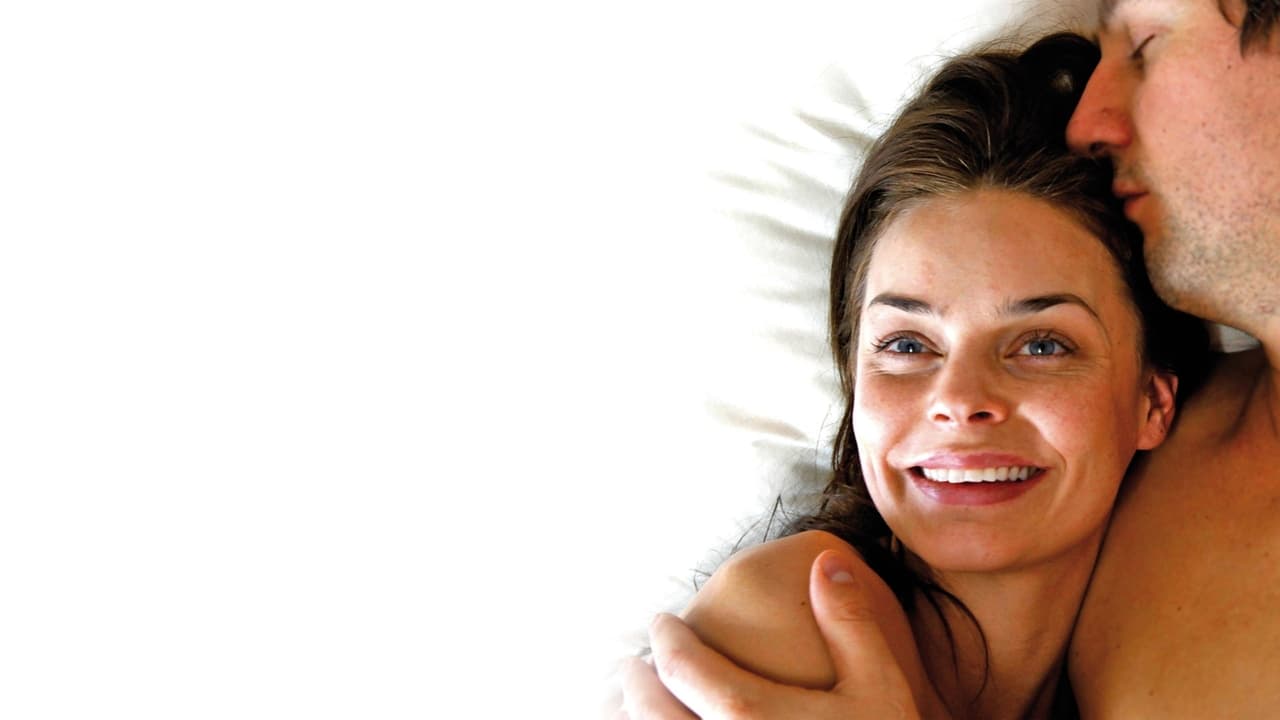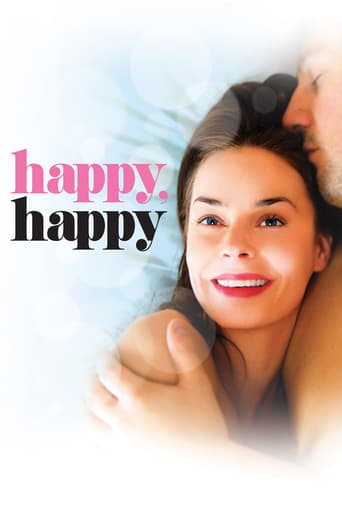

Sykt Lykkelig is not a bad movie, and even though some places market it as a movie that targets the female demographic, it's really a movie for everyone (though maybe not kids).There's several charming moments in this movie. The characters are both really nice, with their quirks and their flaws. The master/slave-games the children are playing is a good example of the dark comedy in this movie. And there's plenty of embarrassing moments in this movie, for those who like that sort of humor. And I like that the movie is set in rural Norway.But the movie never really reaches that high. The charming moments come and go, and the characters do all change throughout the movie, but when it's over, it kind of feels like it was all for nothing.It's a movie worth watching, but I can't imagine revisiting this movie much.
... View MoreHAPPY,HAPPY (dir. Anne Sewitsky) The film is an off-beat examination of two failing marriages in a very isolated, wintry, and picturesque area of Norway. An urban professional couple have fled the city with their adopted African son, and they are trying to reestablish their marriage after the wife's infidelity. Their new neighbors are another couple with a young boy, and the husband is a repressed homosexual, and his wife is in denial. This leads to an illicit sexual affair, and the the film documents the couples' dramatic realignment. Several times during the film a 'Greek Chorus' of singers interrupt the drama with Country- Western inflected Negro Spirituals, and both genres are singularly American, and this made me wonder about the director's attitude towards Americans. Is the director asking Norwegian audiences to view the universal problem of sexual infidelity through American eyes? The songs seemed to be selected to suggest 'lost love' or 'longing' which reinforce a major theme of the film, and reminded me of Lindsay Anderson's surrealistic film, O LUCKY MAN, in which Alan Price's combo provided random musical commentary. Another strange or unusual aspect in the film is the treatment of 'Race'. The African child is asked to play a slave by the other young boy. This is rather inexplicable, yet it might be an attempt to demonstrate the child's confusion over his father's sexual identity. This is a thought provoking and strikingly original film, and I highly recommend it.
... View MoreThere are four main characters in Happy, Happy because it is about two couples; however, one of them really shines through and becomes such a pleasure to watch that it really does not matter what happens with the plot or any of the other players, she is just stunning. I am talking about Agnes Kittelsen who plays Kaja. She is almost always smiling, even when there are situations when there is nothing to smile about. She exudes positive energy and cannot help it when her actions either makes someone else around her happy or rubs someone else the wrong way.Kaja is married to Eirik (Joachim Rafaelsen) and they appear to live in the middle of nowhere Norway. They not only own their own house, but also the one next door which they rent out to people who are usually looking to get away from the city. A city couple from Denmark does exactly that when they abruptly shift from urban to rural. The new couple next door is Sigve (Henrik Rafaelsen) and Elisabeth (Maibritt Saerens). Since there is not much else to do in the immediate locale, the two couples start sharing dinners together and playing games. These games lead to uncomfortable couple comparisons which is never a good thing. Comparing your relationship to someone else's is not the way to end the evening on a high note.During one game, it emerges that Kaja and Eirik have not had sex in over a year and that Elisabeth has recently cheated on Sigve which was a catalyst in their decision to escape to the countryside. The couples also notice the personality clashes and matches around the dinner table. Kaja and Sigve are naturally extroverted and outwardly positive. Elisabeth and Eirik are much more reserved and while not necessarily secretive, they do not have the impulse to share their feelings around the room. These situations and personalities obviously set up what may lead to adulterous liaisons, secrets, and acrimony. However, this is not a heavy handed drama about adultery and revenge. There are laughs, comedic scenes, and an overall light air around the decisions these couples make in response to one another.Each couple also has a son, although Sigve and Elisabeth's son is adopted and black. There are scenes between the two boys, who seem to be around seven years old, which do the film no credit and do not fit. Their sequences are only peripheral to the plot and have no bearing on any central themes, which is all the more puzzling why they are even there. Their interactions disrupt the light flow and mood of the movie and should either be completely rewritten or just taken out.Happy, Happy won the Grand Jury Prize for Dramatic World Cinema at this year's Sundance Film Festival and is also Norway's official submission for the 2012 Academy Awards. It approaches its characters with maturity and understanding, characteristics true for most Scandinavian films but frequently lacking in American ones. It is also challenging to classify Happy, Happy as just a comedy or a drama. There are not very many jokes or moments to laugh at but there are also very few emotional moments which aim for true drama either; it carves out a distinct middle ground.I recommend Happy, Happy for those of us who like Scandinavian films and appreciate movies which take their characters seriously. Thank goodness there are no slapstick moments here which would not fit and no downright weepy 'woe is me' segments. Just lose the scenes with the kids and then you would really have a heck of film on your hands.
... View MoreSykt Lykkelig (in English translated to "Happy Happy") is a black comedy where a couple with an adopted kid move to a very rural part of Norway in the winter, after a decision from the husband. She has had an affair. They are overly welcomed by the main character Kaja, which is helplessly stupid when it comes to deal with her own problems, having been a girl with a troubled parent-less background. That seems also to be the reason she has married a high school boyfriend which obviously is the wrong match for her. These two couples, living in two neighboring houses soon is to ruin what is left to mess up in the new relationships. "Sykt lykkelig" is the debut of director Anne Sewitsky, well played by all actors. The film is chosen to attend Sundance Festival 2011, where it's likely to get praise due to it's oddness. It resembles some of the awkward moments in Sundance-acclaimed Little Miss Sunshine, though this film has less charm and is a much blacker comedy.A lot of comedy's love to give you awkward moments, though they often tend to be severely over-done. In Sykt Lykkelig the awkward moments pile up so that you hate it, while wanting to laugh. Funny? yes! But with a severe undertone. The film is light hearted, but is so often seriously meant, so it actually is a little problem for the viewer. I found myself mostly the only one laughing in the theater seeing it, in a crowd surprisingly mainly male, whilst the trailer seem to tell us this is more of a woman's movie.The film is advertised as a comedy about adultery, cottage cheese, blow jobs and elk-meat. Not a very good tag-line, if you ask me. I, however, choose to see the film as a black comedy taking up the problems of adultery, homosexuality, racism, love, loneliness, marriage-problems as well as the lack of understanding between men and women.A male gospel quartet gives us both the deeper thoughts, as well as giving an uplifting feeling when the characters in the movie pile up problems along the line. Thank God this is film. In the end the film gives hope, but loses track in it's own try of giving credibility. Even though this film gives mixed feelings, I can't help see some great acting here, as well as an interesting director. It has been a difficult film to act for the six persons. A kind of understatement humor, with a very black edge, giving a need for serious touch all the way. Sykt Lykkelig is a different film, and a film for those who'd like to be a fly on the wall, or a Peeping Tom.
... View More